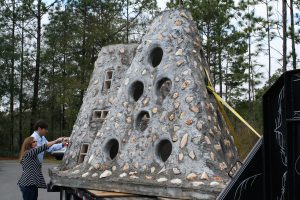The Northwest Florida Regional Artificial Reef Workshop was held February 20 at the Emerald Coast Convention Center in Fort Walton Beach Florida. It followed the Northwest Florida Regional Lionfish Workshop held the day before as many in the audience have interest in both lionfish and artificial reefs. Okaloosa County Commissioner, Captain Kelly Windes, gave the welcome, sharing his experiences as a lifelong local and a 3rd generation charter boat captain operating for over 30 years.
Keith Mille, Director of the Florida Fish and Wildlife Commission Artificial Reef Program gave the state updates. In the state of Florida, a total of 3,534 patch reefs have been deployed. In 2018, 187 new patch reefs were added to the mix. These reefs are made from concrete, formed modules, vessels, barges, metal and rock. The Atlantic side received 33 new patch reefs, while the Gulf side deployed 154. Many of the Gulf reefs are funded using Natural Resource Damage Assessment (NRDA) monies intended to compensate anglers and divers for loss of use during the 2010 Deepwater Horizon Oil Spill. According to a recent economic evaluation of artificial reefs by the University of West Florida’s Dr. Bill Huth, fishing and diving on Escambia County’s artificial reefs support 2,348 jobs and account for more than $150 million in economic activity each year.
County updates for Escambia, Santa Rosa, Okaloosa, Walton, Bay, City of Mexico Beach, Franklin, and Wakulla followed with Victor Blanco, Florida Sea Grant Agent from Taylor County, sharing his process for developing and training a volunteer research dive team to monitor the reefs.
University of Florida researchers provided a reef fish communities update highlighting the response of gray trigger fish and red snapper populations near the reefs, as well as the impact of lionfish on these communities. They also provided answers to the question of how artificial reefs function ecologically versus as fishing habitat. This research hopes to enhance future assessments concerning siting and function of artificial reefs. An anthropologist from Florida State University described his role in conducting cultural resource surveys for artificial reefs. The day ended with a report on the assessment of artificial reefs impacted by Hurricane Michael and a demonstration of updated software used to create side scan mosaics for monitoring.
Presentations were recorded and are available on the Florida Artificial Reefs Facebook page. A statewide Artificial Reef Summit is being organized for February 2020 and will be a great opportunity to learn more about Florida reefs.
“An Equal Opportunity Institution”
- What’s Bugging You? - June 6, 2025
- Getting Your Farm Pond Ready for Spring - March 7, 2025
- The Rare Coastal Dune Lakes of Walton County - September 13, 2024

